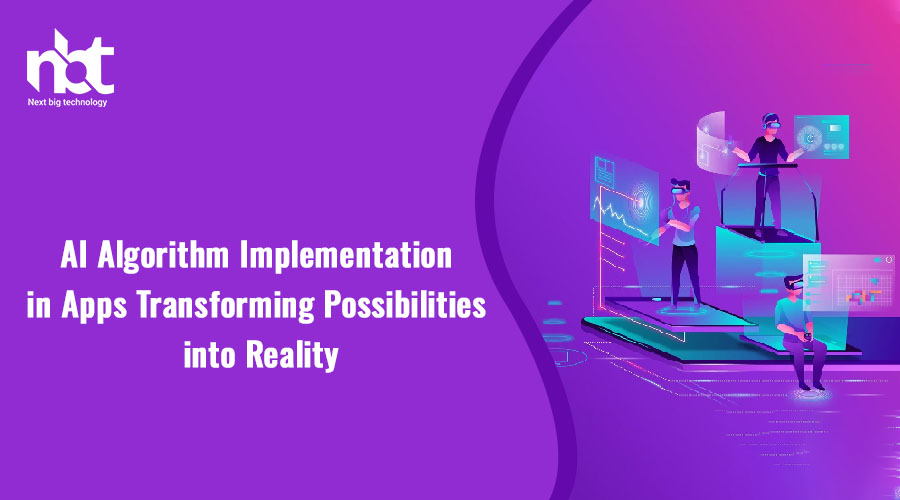Table of Contents
Introduction
In the rapidly advancing landscape of technology, the integration of Artificial Intelligence (AI) algorithms into mobile applications has become a game-changer. This article explores the seamless integration of AI algorithms, their benefits, and the considerations developers should bear in mind to harness the full potential of these transformative technologies.
Understanding AI Algorithm Implementation
AI algorithms form the backbone of intelligent applications, enabling them to analyze data, learn from it, and make informed decisions. The implementation of these algorithms in mobile apps extends functionalities beyond traditional capabilities, unlocking new possibilities for user interaction and experience.
Benefits of AI Algorithm Integration
Enhanced User Experience
Implementing AI algorithms enhances user experiences by personalizing content, providing tailored recommendations, and adapting to user behavior. This level of customization creates more engaging and user-friendly applications.
Improved Decision-Making
AI algorithms enable apps to process vast amounts of data rapidly, facilitating real-time decision-making. This is particularly valuable in applications where quick and accurate decisions are critical, such as in financial or healthcare apps.
Predictive Analytics
The implementation of predictive analytics through AI algorithms allows apps to anticipate user needs, preferences, and trends. This foresight enhances user satisfaction and aids businesses in staying ahead of the competition.
Considerations for AI Algorithm Integration
Data Security and Privacy
As AI algorithms rely on data for learning and decision-making, ensuring robust data security and privacy measures is paramount. Developers must implement encryption, secure data storage, and comply with data protection regulations to safeguard user information.
Computational Resources
AI algorithms, especially complex ones like deep learning models, can be computationally intensive. Developers need to consider the computational resources required for these algorithms and optimize them to ensure efficient app performance.
Continuous Learning and Adaptation
AI algorithms thrive on continuous learning. Developers should design apps that allow algorithms to adapt and improve over time based on user interactions and changing data patterns. Regular updates are essential to keep the algorithms relevant.
Popular AI Algorithms for Mobile Apps
Machine Learning Algorithms
- Linear Regression: Useful for predicting numerical values based on historical data.
- Decision Trees: Ideal for classification and decision-making processes within the app.
- Neural Networks: Powerful for complex tasks such as image and speech recognition.
Natural Language Processing (NLP) Algorithms
- Tokenization: Breaking down text into smaller units for analysis.
- Named Entity Recognition (NER): Identifying and classifying entities within text, like names or locations.
- Sentiment Analysis: Determining the sentiment expressed in written or spoken language.
Case Studies: Successful AI Algorithm Implementations
Virtual Assistants: Siri and Google Assistant
-
- These virtual assistants utilize machine learning and NLP algorithms to understand and respond to user queries, providing a personalized and efficient experience.
Recommendation Systems: Netflix
-
- Netflix employs sophisticated recommendation algorithms that analyze user viewing history to suggest personalized content, keeping users engaged.
Challenges and Future Trends
Challenges in Implementation
- Data Quality: The accuracy and relevance of AI algorithms depend on the quality of the data they are trained on.
- Interpretability: Understanding how AI algorithms make decisions is crucial for transparency and user trust.
- Ethical Considerations: Developers must navigate ethical considerations, ensuring AI algorithms do not reinforce biases or compromise user privacy.
Future Trends in AI Algorithm Integration
- Edge AI: Implementing AI algorithms directly on devices, reducing reliance on cloud-based processing.
- Explainable AI: Enhancing transparency by developing AI models that provide understandable explanations for their decisions.
- AI-powered Augmented Reality: Integrating AI algorithms into AR applications for more immersive and intelligent experiences.
Conclusion
AI algorithm implementation in mobile apps has evolved from being a futuristic concept to a tangible reality. The benefits, considerations, and case studies presented here emphasize the transformative potential of AI in enhancing user experiences and app functionalities. As developers navigate challenges and embrace future trends, AI algorithms will continue to shape the landscape of mobile applications, offering innovative solutions and unlocking new possibilities for users.
Thanks for reading our post “AI Algorithm Implementation in Apps: Transforming Possibilities into Reality”. Please connect with us to know more about “AI Algorithm Implementation in Apps.














